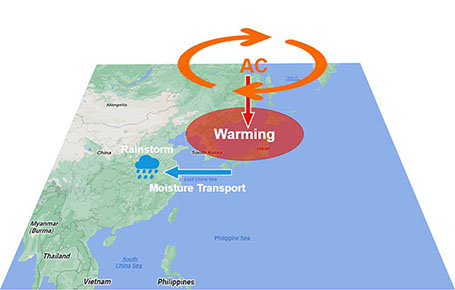
A study published in Advances in Atmospheric Sciences has revealed the unprecedented nature of an anticyclonic anomaly that occurred over Northeast Asia in July 2021. It not only played a pivotal role in the catastrophic extreme precipitation experienced in Henan Province in central China, but also caused a prolonged and intense marine heatwave in the Japan Sea - the strongest event of its kind in the western North Pacific in the past four decades.
The marine heatwave triggered an unprecedented widespread outbreak of harmful algae in the coastal waters, causing severe damage to the marine ecosystems and a record-breaking loss to Japan's coastal fisheries.
"The anomalous anticyclone event over Northeast Asia in July 2021 was unprecedented in terms of intensity and duration. It remained extremely persistent and robust for an astonishing 10 consecutive days from July 13 to July 22, 2021," said Prof. LU Riyu from the Institute of Atmospheric Physics (IAP) of the Chinese Academy of Sciences, corresponding author of the study, emphasizing the magnitude and duration of this anomalous anticyclone.
The impact of the persistent heavy rain was widespread, affecting 150 counties and a staggering 147.86 million people, leading to direct economic losses of 1,200.6 billion yuan. On July 20, Zhengzhou, the capital city of Henan province, suffered a tragic loss of life, with a total of 380 casualties.


86-10-68597521 (day)
86-10-68597289 (night)

52 Sanlihe Rd., Xicheng District,
Beijing, China (100864)

